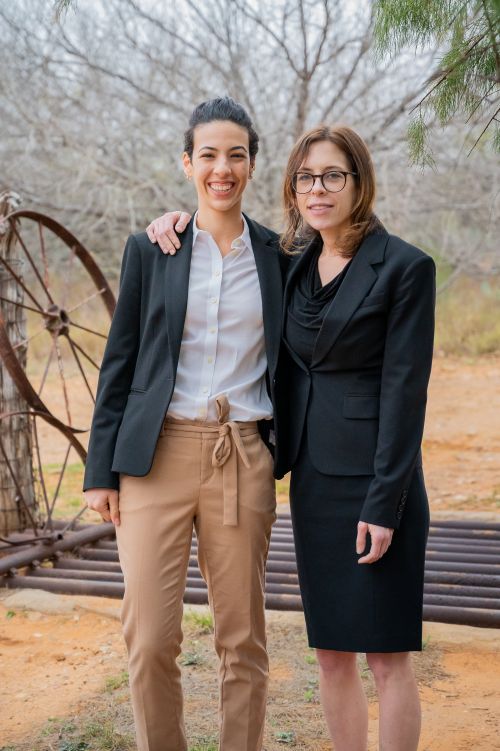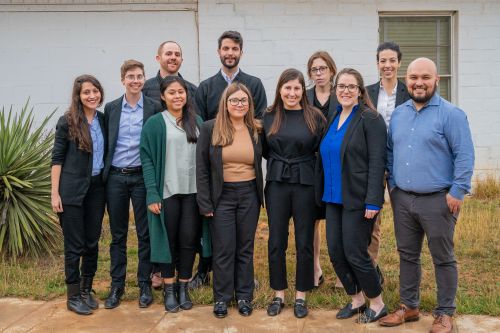
From Left: Immigration Justice Clinic (IJC) alumna Stephanie Alvarez-Jones '18, IJC students Gabriel Cahn, Kara Nowakowski, Andrea Barrientos, Ariel Rosen, Alberto Casadevall, Gladys Mozo, Sadie Casamenti, Yael Ben Tov, IJC Co-Director and Professor Lindsay Nash, IJC Clinical Teaching Fellow Mauricio Noroña.
Students and faculty members in the Kathryn O. Greenberg Immigration Justice Clinic (IJC) served more than 100 asylum-seeking mothers and children during a trip to the South Texas Family Residential Center in February. The trip was funded through the John and Kathleen Schreiber Foundation.
“It’s officially called a residential center, but it is a jail,” said Stephanie Alvarez-Jones ’18, an IJC alumna and Justice Catalyst Fellow at Texas RioGrande Legal Aid, who trained clinic students on the trip.
The most common service students provided in the Dilley, Texas residential center was preparing clients for their “credible fear interviews” which determine whether immigrants’ fear of returning to their home countries justifies their staying in the United States and pursuing pathways to status. IJC students also offered clients individual consultations, accompanied them to interviews and prepared them for court hearings.
IJC Co-Director and Clinical Assistant Professor Lindsay Nash said she noticed some differences on this year’s trip.
“Most people were held to a higher standard. It was incredibly challenging this year because, this already problematic process has become even more rushed and lacking in basic humanity,” Nash said.
Clinic student Alberto Casadevall wrote about the obstacles he saw with the current administration: “In the week that I spent in Dilley, I learned that despite the crushing weight of an indifferent government, there is still room to be an effective advocate and that even an hour of work can drastically change the course of a person's life.”
Alvarez-Jones noted that recent policy changes, such as one targeting immigrants from Central American counties who pass through Mexico, are making it more difficult for immigrants to obtain asylum.
“This is the new reality for clients,” Alvarez-Jones said. “They are fighting for their lives and our government has made it harder and harder at every turn.”
Alvarez-Jones also pointed out the obstacles these families face in immigration proceedings: “They have no voice. They are silenced and hushed and we have to fight for them to be heard.”
She added that she speaks Spanish every day and is trying to learn Haitian Creole to assist her clients. “A big part of our role here is to give a space for these families to use their voice and then to amplify it.”
Nash spoke about how the trip allowed students to work on their problem-solving skills while making a lasting difference.
“It required quick thinking – students came up with very creative arguments,” Nash said. “Even just being there for a week, they changed these people’s lives.”
In a reflection letter about the trip, 3L Kara Nowakowski noted that according to a 2017 study, 94 percent of those detained in immigration proceedings without a lawyer receive deportation orders.
“Over the course of the week, I came to understand something the statistics fail to illustrate—legal advocacy is extraordinarily important, it is in wildly short supply, and people who need it most are granted only a tenuous relationship with it,” Nowakowski wrote.
Nash said that although the students prepare for the trip, nothing can compare to attending in person.
“It was a crash course in the immediate impact of great advocacy and lawyering,” Nash said. “It made a lot of them feel invigorated too.”
Nash also spoke about the unique perspective that Alvarez-Jones brought to the trip.
“It was a great moment to see one of our students give the training to 25 students,” Nash said. “I felt incredibly proud to see a former clinic student take the lead in this work.”
Many of the students plan on pursuing careers as immigration attorneys.
“I came to Cardozo to pursue a career in immigration law, and my experience at Dilley strengthened my resolve and reaffirmed my passion for this work,” wrote Sadie Casamenti, IJC clinical intern.
IJC Clinical Teaching Fellow Mauricio Noroña, who accompanied students on this year's trip, commented on the increasing difficulties asylum seekers are facing during today's global pandemic.
“Women and children at Dilley are now facing even tougher odds. Against the advice of medical experts, the immigration agencies have so far refused to release people held in congregate settings, like their detention centers, while the novel coronavirus pandemic spreads throughout the United States. To make matters worse, the government is using COVID-19 as yet one more excuse to shut the door on those seeking safety in our country. Today, more than ever, legal advocacy on behalf of these families matters,” Noroña said.


